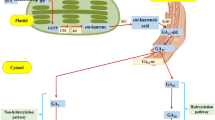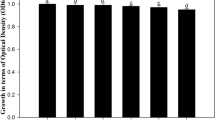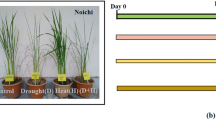Abstract
Key message
Hormone treatment enhanced the content of osmotic substances under high-temperature conditions. The effect of ABA and BR treated separately is better than treated together.
Abstract
To determine the effect of abscisic acid (ABA), brassinolide (BR) and ABA + BR on grape quality under high-temperature stress, various metabolites were analyzed. Compared with the control (CK), DL-tryptophan, d-raffinose, geniposidic acid, dodecanedioic acid and polyphenols were found to be higher after ABA treatment. After BR treatment, amino acids and poricoic acid B were higher than in CK. And carbohydrates and amino acids were up-regulated after ABA + BR treatment. BR and ABA + BR treatment also induced higher endogenous ABA and epibrassinolide contents. In addition, treated grape had higher soluble solid concentrations and soluble sugar content, and delayed the degradation of middle lamella and microfibrils. Antioxidant and heat shock-related genes were examined, which significantly increased in treated grape. The finding of this study suggested that ABA, BR and ABA + BR are very useful for alleviating high-temperature damage by increasing the accumulation of osmotic adjustment substances, and endogenous hormones content.





Similar content being viewed by others
References
Abass M, Rajashekar CB (1993) Abscisic acid accumulation in leaves and cultured cells during heat acclimation in grapes. HortScience 28:50–52. https://doi.org/10.21273/HORTSCI.28.1.50
Bonomelli C, Fernández V, Martiz JO, Videla X, Arias MI, Rojas-Silva X, Nario A (2019) Absorption and distribution of root, fruit, and foliar-applied 45Ca in ‘Clemenules’ mandarin trees. J Sci Food Agric 100:4643–4650. https://doi.org/10.1002/jsfa.10496
Brummell DA (2006) Cell wall disassembly in ripening fruit. Funct Plant Biol 33:103–119. https://doi.org/10.1071/FP05234
Copolovici L, Kännaste A, Pazouki L, Niinemets Ü (2012) Emissions of green leaf volatiles and terpenoids from Solanum lycopersicum are quantitatively related to the severity of cold and heat shock treatments. J Plant Physiol 16:664–672. https://doi.org/10.1016/j.jplph.2011.12.019
Daie J, Campbell WF (1981) Response of tomato plants to stressful temperatures. Increase in abscisic acid concentrations. Plant Physiol 67:26–29. https://doi.org/10.1104/pp.67.1.26
Dar NA, Amin I, Wani W, Wani SA, Shikari AB, Wani SH, Masoodi KZ (2017) Abscisic acid: a key regulator of abiotic stress tolerance in plants. Plant Gene 11:106–111. https://doi.org/10.1016/j.plgene.2017.07.003
Dixon RA, Paiva NL (1995) Stress-induced phenylpropanoid metabolism. Plant Cell 7:1085–1097. https://doi.org/10.1105/tpc.7.7.1085
Fiehn O (2002) Metabolomics—the link between genotypes and phenotypes. Plant Mol Biol 48:155–171. https://doi.org/10.1023/A:1013713905833
Foyer CH, Lopez-Delgado H, Dat JF, Scott IM (1997) Hydrogen peroxide and glutathione associated mechanisms of acclamatory stress tolerance and signaling. J Plant Physiol 100:241–254. https://doi.org/10.1111/j.1399-3054.1997.tb04780.x
Halliwell B (1974) Superoxide dismutase, catalase and glutathione peroxidase: solutions to the problems of living with oxygen. New Phytol 73:1075–1086. https://doi.org/10.1111/j.1469-8137.1974.tb02137.x
Islam MR, Feng BH, Chen TT, Fu WM, Zhang CX, Tao LX, Fu GF (2018) Abscisic acid prevents pollen abortion under high-temperature stress by mediating sugar metabolism in rice spikelets. Physiol Plant 165:644–663. https://doi.org/10.1111/ppl.12759
Jadhav U, Mundhe S, Kumar Y, Jogaiah S, Upadhyay A, Gupta VS, Narendra Y, Kadoo NY (2021) Gibberellic acid induces unique molecular responses in ‘Thompson Seedless’ grapes as revealed by non-targeted metabolomics. J Plant Growth Regul 40:293–304. https://doi.org/10.1007/s00344-020-10102-7
Jia HR, Zhang ZB, Zhang SH, Fu WH, Su LY, Fang JG, Jia HF (2020) Effect of the methylation level on the grape fruit development process. J Agric Food Chem 68:2099–2115. https://doi.org/10.1021/acs.jafc.9b07740
Jin SH, Li XQ, Wang GG, Zhu XT (2015) Brassinosteroids alleviate high-temperature injury in Ficus concinna seedlings via maintaining higher antioxidant defence and glyoxalase systems. AoB Plants. https://doi.org/10.1093/aobpla/plv009
Kader AA (2008) Flavor quality of fruit and vegetables. J Sci Food Agric 88:1863–1868. https://doi.org/10.1002/jsfa.3293
Kaplan F, Kopka J, Haskell DW, Zhao W, Schiller KC, Gatzke N, Sung DY, Guy CL (2004) Exploring the temperature-stress metabolome of Arabidopsis. Plant Physiol 136:4159–4168. https://doi.org/10.1104/pp.104.052142
Khan Z, Shahwar D (2020) Role of heat shock proteins (HSPs) and heat stress tolerance in crop plants. Sustain Agric Era Clim Change 7:211–234. https://doi.org/10.1007/978-3-030-45669-6_9
Kishor PBK, Sreenivasulu N (2014) Is proline accumulation per se correlated with stress tolerance or is proline homeostasis a more critical issue? Plant Cell Environ 37:300–311. https://doi.org/10.1111/pce.12157
Kurepin LV, Qaderi MM, Back TG, Reid DM, Pharis RP (2008) A rapid effect of applied brassinolide on abscisic acid concentrations in Brassica napus leaf tissue subjected to short-term heat stress. Plant Growth Regul 55:165–167. https://doi.org/10.1007/s10725-008-9276-5
Liu XZ, Huang BR (2000) Heat stress injury in relation to membrane lipid peroxidation in creeping bent grass. Crop Sci 40:503–510. https://doi.org/10.2135/cropsci2000.402503x
Liu J, Hasanuzzaman M, Wen H, Zhang J, Peng T, Sun H, Zhao Q (2019) HT and drought stress cause abscisic acid and reactive oxygen species accumulation and suppress seed germination growth in rice. Protoplasma 256:1217–1227. https://doi.org/10.1007/s00709-019-01354-6
Luo HB, Ma L, Xi HF, Duan W, Li SH, Loescher W, Wang JF, Wang LJ (2011) Photosynthetic responses to heat treatments at different temperatures and following recovery in grapevine (Vitis amurensis L.) leaves. PLoS One 6:e23033. https://doi.org/10.1371/journal.pone.0023033
Maestri E, Klueva N, Perrotta C, Gulli M, Nguyen HT, Marmiroli N (2002) Molecular genetics of heat tolerance and heat shock proteins in cereals. Plant Mol Biol 48:667–681. https://doi.org/10.1023/A:1014826730024
Min Z, Li C, Yanjun H, Qian T, Wang H (2001) Preservation of fresh grapes at ice-temperature-high-humidity. Int Agrophys 15:277–281. https://www.researchgate.net/publication/26552203
Negrel L, Halter D, Wiedemann-Merdinoglu S, Rustenholz C, Merdinoglu D, Hugueney P, Baltenweck R (2018) Identification of lipid markers of Plasmopara viticola infection in grapevine using a non-targeted metabolomic approach. Front Plant Sci 9:360. https://doi.org/10.3389/fpls.2018.00360
Panikulangara TJ, Eggers-Schumacher G, Wunderlich M, Stransky H, Schöffl F (2004) Galactinol synthase1. A novel heat shock factor target gene responsible for heat-induced synthesis of raffinose family oligosaccharides in Arabidopsis. Plant Physiol 136:3148–3158. https://doi.org/10.1104/pp.104.042606
Ribéreau-Gayon P, Boidron JN, Terrier A (1975) Aroma of Muscat grape varieties. J Agric Food Chem 23:1042–1047. https://doi.org/10.1021/jf60202a050
Rivero RM, Ruiz JM, Garcia PC, Lopez-Lefebre LR, Sanchez E, Romero L (2001) Resistance to cold and heat stress: accumulation of phenolic compounds in tomato and watermelon plants. Plant Sci 160:315–321. https://doi.org/10.1016/S0168-9452(00)00395-2
Rontein D, Basset G, Hanson AD (2002) Metabolic engineering of osmoprotectant accumulation in plants. Metab Eng 4:49–56. https://doi.org/10.1006/mben.2001.0208
Ruffner HP, Hawker JS, Hale CR (1976) Temperature and enzymic control of malate metabolism in berries of Vitis vinifera. Phytochemistry 15:1877–1880. https://doi.org/10.1016/S0031-9422(00)88835-4
Sharma P, Kumar A, Bhardwaj R (2016) Plant steroidal hormone epibrassinolide regulate-heavy metal stress tolerance in Oryza sativa L. by modulating antioxidant defense expression. Environ Exp Bot 122:1–9. https://doi.org/10.1016/j.envexpbot.2015.08.005
Smit BA, Engels WJM, Smit G (2009) Branched chain aldehydes: production and breakdown pathways and relevance for flavor in foods. Appl Microbiol Biotechnol 81:987–999. https://doi.org/10.1007/s00253-008-1758-x
Wahid A, Close TJ (2007) Expression of dehydrins under heat stress and their relationship with water relations of sugarcane leaves. Biol Plant 51:104–109. https://doi.org/10.1007/s10535-007-0021-0
Wahid A, Gelani S, Ashraf M, Foolad MR (2007) Heat tolerance in plants: an overview. Environ Exp Bot 61:199–223. https://doi.org/10.1016/j.envexpbot.2007.05.011
Wang J, Xia H, Lin LJ, He H, Liang D, Lv XL (2016) Exogenous abscisic acid increases resistances against abiotic stress and improve fruit quality of grape. J Anim Plant Sci 26:1326–1333
Wani AS, Ahmad A, Hayat S, Tahir I (2019) Epibrassinolide and proline alleviate the photosynthetic and yield inhibition under salt stress by acting on antioxidant system in mustard. Plant Physiol Bioch 135:385–394. https://doi.org/10.1016/j.plaphy.2019.01.002
Xi ZM, Wang ZZ, Fang YL, Hu ZY, HuY DMM, Zhang ZW (2013) Effects of 24-epibrassinolide on antioxidation defense and osmoregulation systems of young grapevines (V. vinifera L.) under chilling stress. Plant Growth Regul 71:57–65. https://doi.org/10.1007/s10725-013-9809-4
Xu S, Li JL, Zhang XQ, Wei H, Cui LJ (2006) Effects of heat acclimation pretreatment on changes of membrane lipid peroxidation, antioxidant metabolites, and ultrastructure of chloroplasts in two cool-season turfgrass species under heat stress. Environ Exp Bot 56:274–285. https://doi.org/10.1016/j.envexpbot.2005.03.002
Xu F, Xi ZM, Zhang H, Zhang CJ, Zhang ZW (2015) Brassinosteroids are involved in controlling sugar unloading in Vitis vinifera ‘Cabernet Sauvignon’ berries during véraison. Plant Physiol Biochem 94:197–208. https://doi.org/10.1016/j.plaphy.2015.06.005
Yamada M, Yamane H, Sato A, Hirakawa N, Iwanami H, Yoshinaga K, Ozawa T, Mitani N, Shiraishi M, Yoshioka M, Nakajima I, Nakano M, Nakaune R (2008) New grape cultivar ‘Shine Muscat.’ Bull Natl Inst Fruit Tree Sci 7:21–38
Zhang K, Liu ZJ, Guan L, Zheng T, Jiu ST, Zhu XD, Jia HF, Fang JG (2018) Changes of anthocyanin component biosynthesis in ’Summer Black’ grape berries after the red flesh mutation occurred. J Agric Food Chem 66:9209–9218. https://doi.org/10.1021/acs.jafc.8b02150
Acknowledgements
We would like to express our gratitude to Ruiping Tian from the State Key Laboratory of Crop Genetics & Germplasm Enhancement, Nanjing Agricultural University, for helping me analyze GC–MS data.
Funding
This work was supported by the national key research and development program (2019YFD1002500), National Natural Science Foundation of China (31872938, 31872047, 31672131), Xinjiang United fund (CXFZ202016), Natural science research project of colleges and universities in Jiangsu Province (20KJD210001), Jiangsu Natural Science Foundation (BK20201176).
Author information
Authors and Affiliations
Contributions
LJH and DTY treated the samples and conducted data analysis and drafted the manuscript. ZT and ZYP helped data analysis. FJG helped to revise the manuscript. YK helped to draft the manuscript. DTY participated in the design of the study. JHF designed and coordinated this study and revised the manuscript. All authors read and approved the final manuscript.
Corresponding author
Ethics declarations
Conflict of interest
The authors declare no conflict of interest.
Additional information
Communicated by Zhanyuan Jon Zhang.
Publisher's Note
Springer Nature remains neutral with regard to jurisdictional claims in published maps and institutional affiliations.
Supplementary Information
Below is the link to the electronic supplementary material.
Rights and permissions
About this article
Cite this article
Lv, J., Dong, T., Zhang, Y. et al. Metabolomic profiling of brassinolide and abscisic acid in response to high-temperature stress. Plant Cell Rep 41, 935–946 (2022). https://doi.org/10.1007/s00299-022-02829-2
Received:
Accepted:
Published:
Issue Date:
DOI: https://doi.org/10.1007/s00299-022-02829-2




